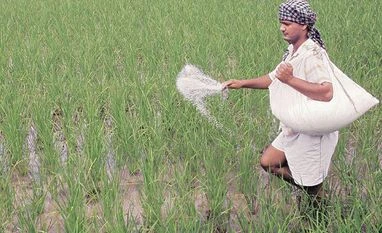The government will introduce direct benefit transfer (DBT) of fertiliser subsidies in five more states, including Punjab, next month, a senior Fertiliser Ministry official said.
Last month, the DBT facility for fertiliser subsidies was rolled out in 14 states and Union Territories (UTs).
The government bears about Rs 70,000 crore annually as fertiliser subsidy to provide cheaper farm nutrient to farmers.
"Fertiliser DBT is working smoothly in 14 states. We have shortlisted five big states -- Punjab, Haryana, Chhatisgarh, Madya Pradesh and Andhra Pradesh -- that will go live in December," Fertiliser Joint Secretary Dharam Pal told PTI.
The states and UTs where the DBT facility has been rolled out are: Maharashtra, Rajasthan, Uttarkhand, Goa, Nagaland, Manipur, Tripura, Assam, Mizoram, Daman and Diu, Dadra Nagar Haveli, Andamana and Nicobar, Delhi and Puducherry.
For the remaining 12 states such as Karnataka, Uttar Pradesh, Gujarat and West Bengal, the DBT scheme will be rolled out in January 2018.
The difficult phase is over and the software is working better now, the official said, adding that glitches in implementation are being resolved on a daily basis.
Niti Aayog-appointed MicroSave, an NGO, is evaluating the implementation. "It is bringing to our notice the problem areas and we are rectifying them," he added.
Stating that the government is implementing the phase-I of the fertiliser DBT at present, Pal said: "Under this, we are transferring subsidy to companies after checking retail sales data captured through the Point of Sale (PoS) machines." The transfer of fertiliser subsidy directly into farmers' bank account will be taken up in the second phase once Niti Aayog suggests an appropriate model, he said.
Therefore, the DBT being implemented for fertiliser subsidy payments is slightly different from that in case of cooking gas, he added.
For cooking gas subsidy, customers buy gas cylinders at the market price and the government deposits the subsidy into the customer's bank account later.
In case of fertilisers, farmers may not be able to make upfront payments because some of the soil nutrients are very costly. Therefore, farmers will continue to buy fertiliser from the retailer at subsidised rate and the transaction details will be recorded on the PoS machines.
The official shared that the impact of fertiliser DBT will be known after it is rolled out in the entire country.
"It is too early to say. Till we get one-year figure for the entire country, we would not know whether it has improved distribution or reduced consumption," he said.
Unlock 30+ premium stories daily hand-picked by our editors, across devices on browser and app.
Pick your 5 favourite companies, get a daily email with all news updates on them.
Full access to our intuitive epaper - clip, save, share articles from any device; newspaper archives from 2006.
Preferential invites to Business Standard events.
Curated newsletters on markets, personal finance, policy & politics, start-ups, technology, and more.
)